The Ambassador of Chile to India Junan Angula M stated that Chile is known for its stable economy and favorable business environment. So, Bangladeshi businessmen have numerous opportunities here. One of the key areas is the agricultural sector, where Bangladeshi businessmen can invest in exporting agricultural products.
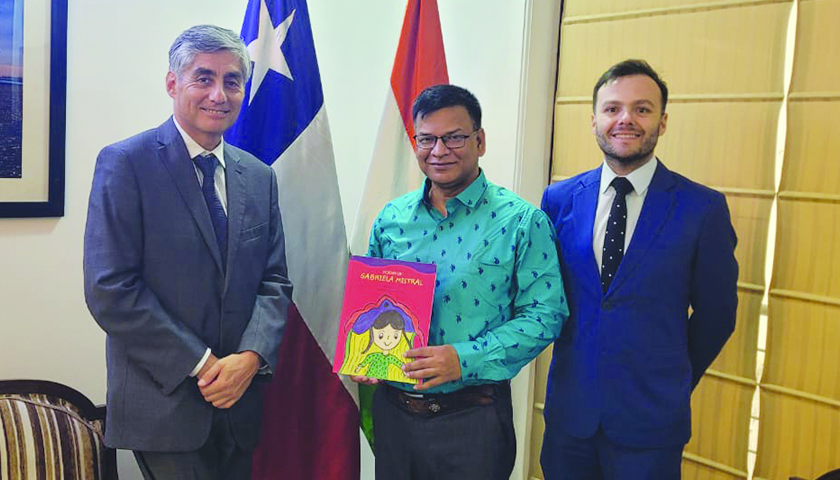
Junan Angula M is the Ambassador of Chile to India also concurrent to Bangladesh, Sri Lanka and Nepal. He has recently opined regarding different issues between Bangladesh and Chile. President of Bangladesh Travel Writers Association Ashrafuzzaman Uzzal has recently taken an interview of the ambassador. The interview has been published for our readers.
What is the diplomatic relationship between Bangladesh and Chile?
The diplomatic relationship between Bangladesh and Chile is characterized by a spirit of cooperation and mutual respect. Both countries have established diplomatic ties, which are reflected in their shared membership in international groups such as the Group of 77 and the Non-Aligned Movement. These memberships signify a common interest in promoting economic development and maintaining a stance of non-alignment in global politics.
Since establishing diplomatic relations, Bangladesh and Chile have engaged in various bilateral interactions aimed at enhancing their partnership. These interactions include political consultations and cooperation in international forums. The two nations also share a commitment to supporting each other in global initiatives, particularly those related to trade, sustainable development, and climate change.
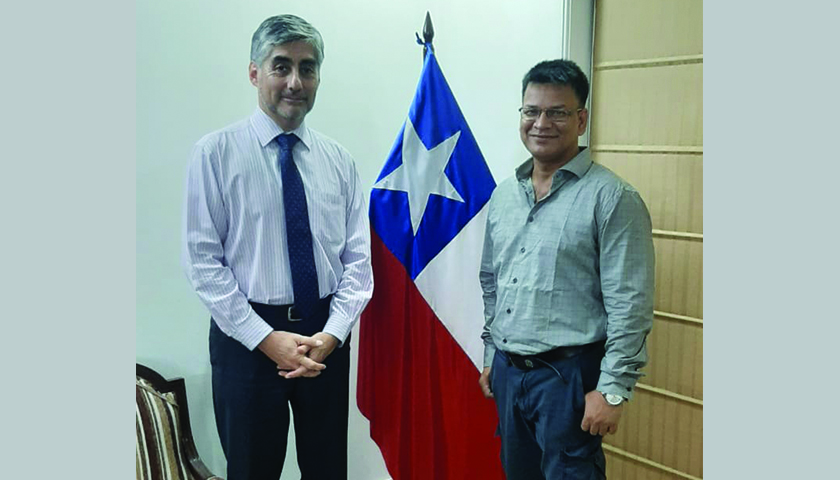
Cultural exchanges and people-to-people contacts are also an important aspect of Bangladesh-Chile relations. These exchanges foster a deeper understanding and appreciation of each other's cultures and traditions. Educational collaborations and tourism are potential areas for further growth, which could strengthen the bonds between the citizens of both countries.
The diplomatic relationship between Bangladesh and Chile is robust and multifaceted, grounded in mutual respect and cooperation. Both countries are committed to furthering their bilateral relations through continuous dialogue and collaborative efforts in various sectors. This relationship not only enhances their bilateral ties but also contributes to their respective roles on the global stage.

What are the top 5 exports and imports items in Chile and from which country they do most export & imports?
Chile's economy is significantly driven by its export activities, with the top five exports being Copper Ore, Refined Copper, Carbonates, Fish Fillets, and Raw Copper. Copper Ore leads the list with exports valued at $22.8 billion, followed by Refined Copper at $18.4 billion. Carbonates, primarily lithium carbonate, contribute $7.72 billion, while Fish Fillets and Raw Copper stand at $3.91 billion and $2.97 billion, respectively.
On the import side, Chile's top five items include Crude Petroleum, Cars, Refined Petroleum, Broadcasting Equipment, and Packaged Medicaments. These imports are crucial for the country's industrial and consumer needs, reflecting Chile's reliance on foreign resources and technology to support its economic activities.
The primary trading partners for Chile’s exports are China, the United States, and Japan. China is the largest recipient of Chilean exports, particularly copper, which is vital for China's manufacturing and construction sectors. The United States and Japan also import significant amounts of copper and other minerals, contributing to their industrial and technological advancements.
For imports, Chile mainly sources from the United States, China, and Brazil. The United States provides a substantial portion of Chile's imported goods, including machinery and technology. China supplies a wide range of consumer and industrial products, while Brazil contributes with petroleum and automotive products, underscoring the interconnected nature of regional trade within South America.

Is there any High officials visiting between Bangladesh and Chile?
Yes, there have been visits by high officials between Bangladesh and Chile, reflecting the growing diplomatic relationship between our two countries. In 2011, Mohamed Mijarul Quayes, the former Foreign Secretary of Bangladesh, paid an official visit to Chile. This visit was significant as it aimed to enhance bilateral relations and explore new areas of cooperation between the two nations. In 2015 the Director of the National authority on agriculture and livestock of Chile (SAG), Angel Sartori, visited Dhaka and an MoU of cooperation in phytosanitary matters was signed.
More recently, the Chilean President Gabriel Boric made a brief stopover at Hazrat Shahjalal International Airport in Dhaka. Although the visit was brief, it highlighted the ongoing diplomatic engagement and the importance of maintaining direct communication between the highest offices of both countries. Such interactions pave the way for future collaboration and mutual understanding. On October 2023 both countries held the First Foreign Office Consultations, in Santiago, at level of Vice ministers.
These visits are part of a broader effort to foster mutual understanding and cooperation on various global issues, including trade, environmental sustainability, and cultural exchange. These interactions underscore our commitment to maintaining a dynamic and fruitful diplomatic relationship, ensuring that both nations can work together on matters of mutual interest and benefit.
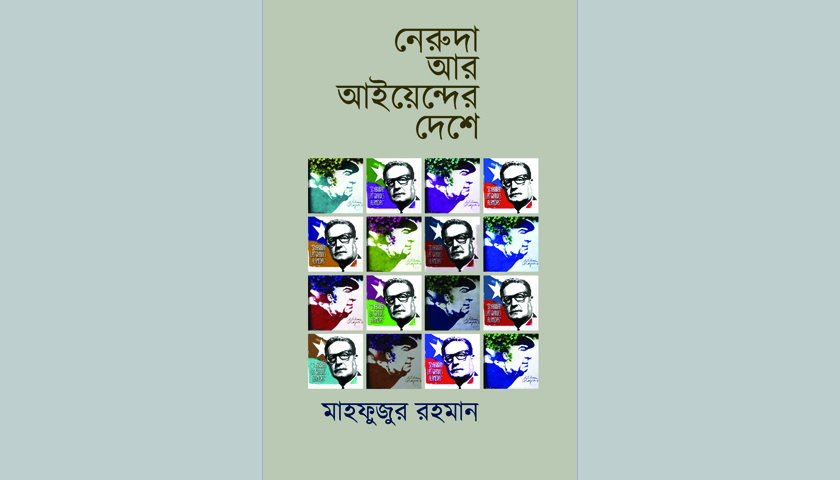
The exchange of high-level visits between Bangladesh and Chile not only strengthens our bilateral ties but also opens new avenues for collaboration. These interactions ensure that our diplomatic efforts remain aligned with the goals of fostering closer ties and supporting each other in the international arena.
Chile is called ‘país de poetas’ (Land of Poets). When we talk about world literature, Chilean poet Gabriela Mistral, Pablo Neruda's name comes into our mind? How do you feel about it as an Ambassador of Chile?

As the Ambassador of Chile to Bangladesh, I feel an immense sense of pride and honor when I hear our country being referred to as "País de poetas" or "land of poets." This title is a testament to the profound impact that our poets, particularly Gabriela Mistral and Pablo Neruda, have had on world literature. Their contributions have not only elevated Chile's cultural heritage but have also enriched global literary traditions with their unique voices and perspectives.
Gabriela Mistral and Pablo Neruda are important figures in the literary world. Mistral, the first Latin American woman to win the Nobel Prize in Literature in 1945, brought forth themes of love, sorrow, and nature through her poignant poetry. Her work resonated with universal human experiences, making her a beloved poet worldwide. Similarly, Pablo Neruda, who won the Nobel Prize in 1971, captivated readers with his passionate and deeply humanistic verses. His poems on love, politics, and nature have left an indelible mark on global literature
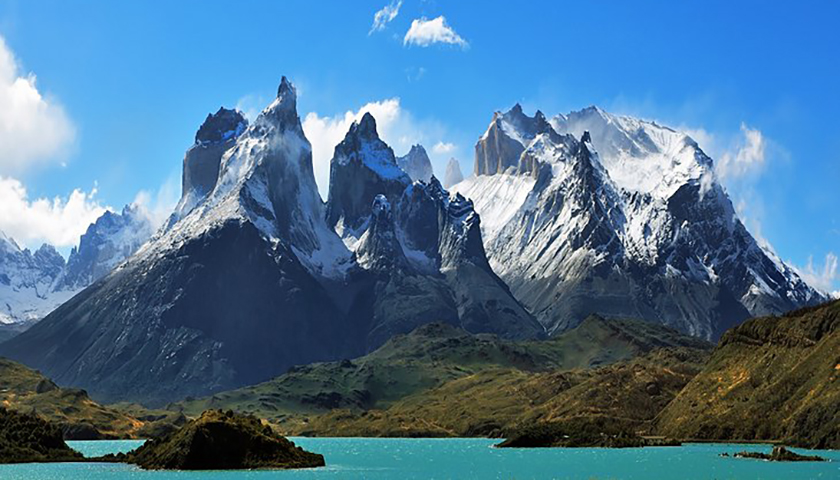
The legacy of these poets goes beyond their literary achievements; it is also about how they represented Chile on the world stage. Their works have been translated into numerous languages, allowing people from different cultures to connect with the Chilean spirit and its poetic heritage. This global appreciation reinforces the idea that literature can transcend borders and bring people closer together through shared emotions and experiences.
As an ambassador, I see their legacy as a bridge between Chile and the rest of the world, fostering cultural exchange and understanding. Their poetry continues to inspire and influence new generations of writers and readers alike. It is a privilege to represent a country with such a rich literary tradition, and I am committed to promoting and celebrating our cultural heritage both in Bangladesh and internationally.
There are 4/5 Bangladeshi travel writers who wrote Travel Books about Chile, How do you see it?
I am immensely pleased and honored to learn that several Bangladeshi travel writers have chosen to write about Chile. This interest reflects a deep curiosity and appreciation for our country's diverse landscapes, rich culture, and vibrant history. Such literary endeavors not only highlight the unique experiences that Chile has to offer but also strengthen the cultural bridge between our two nations.
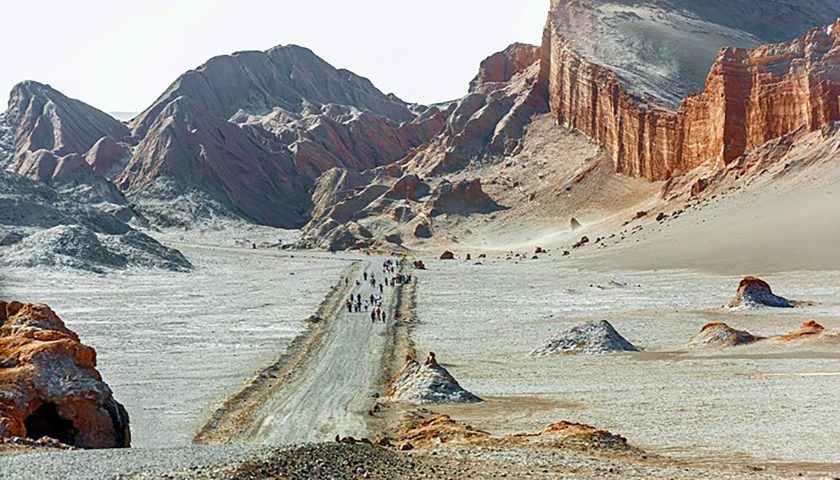
The works of these Bangladeshi writers serve as a testament to the universal appeal of Chile's natural beauty and cultural heritage. From the breathtaking Andes mountains to the picturesque vineyards of the Central Valley, and the fascinating history of our cities, these travel books help to introduce and promote Chile to a wider audience in Bangladesh. It is heartening to see how our country's charm and allure have inspired writers from across the globe to share their experiences and perspectives.
Moreover, these travel books contribute significantly to the cultural exchange between Chile and Bangladesh. By sharing their journeys and observations, Bangladeshi writers offer their readers an opportunity to virtually explore Chile, fostering a deeper understanding and connection between our peoples. This exchange of stories and experiences helps to break down cultural barriers and build mutual respect and admiration.
I am grateful to these writers for their contributions and encourage more such initiatives. Their works not only celebrate Chile's beauty and diversity but also pave the way for enhanced tourism and bilateral relations. It is through such cultural exchanges that we can continue to strengthen the ties between Chile and Bangladesh, promoting friendship and collaboration in various fields.
There are only two countries in the world where you will find the Lapis Lazuli is a precious stone, one in Afghanistan and another one in Chile, Please say something more about Lapis Lazuli?
Lapis Lazuli is a stunning blue gemstone that has been cherished for thousands of years. This semi-precious stone is renowned for its deep, vibrant blue color, often speckled with golden pyrite, giving it a starry-night appearance. Historically, lapis lazuli has been prized for its beauty and was used to create jewelry, ornaments, and even the ultramarine pigment used in Renaissance paintings.
In Chile, lapis lazuli is mined primarily in the Andes Mountains, specifically in the Ovalle region. This location is one of only two significant sources of lapis lazuli in the world, the other being Afghanistan. The high-quality Chilean lapis lazuli, with its intense blue color and minimal calcite inclusions, is highly sought after in the global market. This gemstone symbolizes truth, wisdom, and royalty, adding to its allure.
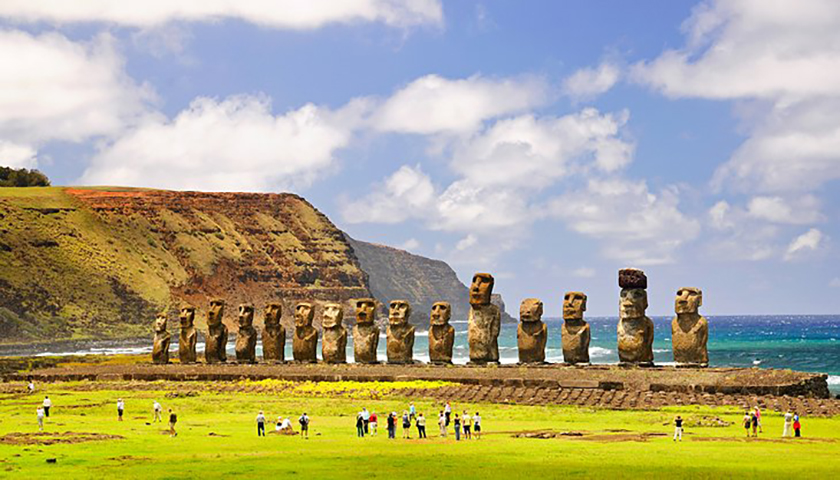
The presence of lapis lazuli in Chile not only adds to the country's rich mineral wealth but also contributes to its cultural heritage. Artisans in Chile skillfully craft this gemstone into various forms of jewelry and decorative items, showcasing the stone's natural beauty. These crafts are a testament to the traditional skills and artistry of the Chilean people, making lapis lazuli an integral part of the nation's cultural identity.
As the Ambassador of Chile to Bangladesh, I am proud to share the significance of lapis lazuli and its role in our heritage. The gemstone represents a connection between our natural resources and cultural expressions. I encourage the people of Bangladesh to explore the beauty of Chilean lapis lazuli and appreciate the craftsmanship that transforms this precious stone into works of art.
Like to know about The Atacama Desert has some of the world's best stargazing
The Atacama Desert in Chile is renowned for offering some of the world's best stargazing experiences. This unique desert, often referred to as the driest place on Earth, provides exceptionally clear skies due to its high altitude, dry climate, and minimal light pollution. These conditions make the Atacama Desert an ideal location for both amateur and professional astronomers to observe the night sky in all its glory.
One of the most popular activities in the Atacama Desert is guided stargazing tours. These tours allow visitors to explore the cosmos through powerful telescopes, providing breathtaking views of planets, stars, and distant galaxies. Knowledgeable guides often accompany these tours, sharing insights about celestial objects and the science of astronomy. Locations like San Pedro de Atacama serve as excellent bases for these stargazing adventures, attracting enthusiasts from around the world.
In addition to tours, the Atacama Desert is home to several major observatories, including the Atacama Large Millimeter/submillimeter Array (ALMA), which is one of the largest and most advanced telescopes in the world. ALMA and other observatories in the region conduct cutting-edge astronomical research, contributing significantly to our understanding of the universe. The presence of these facilities highlights the global importance of the Atacama Desert in the field of astronomy.

As the Ambassador of Chile to Bangladesh, I am proud to promote the Atacama Desert as a premier destination for stargazing and scientific discovery. Whether you are an avid astronomer or simply a curious traveler, the Atacama Desert offers an unparalleled opportunity to connect with the wonders of the night sky. I encourage everyone to experience the magic of stargazing in this extraordinary part of Chile.
We heard that Chile is the only country in the world where water is private, can you please describe it more.
This system was established in the 1980s and was enshrined in the 1980 Constitution, which declared water as a private commodity. This model allows private companies to own and manage water rights, making water a tradable asset.
The privatization of water in Chile was driven by the need for significant investment in water infrastructure, especially to expand wastewater treatment. Proponents argued that this system led to more efficient and reliable water services, as private companies are incentivized to invest in and maintain the water supply infrastructure.
However, this model has also faced considerable discussions. Some people highlight that the privatization has led to inequality in water access, with rural and lower-income communities often facing higher costs and limited use. The system has been said of prioritizing profit over equitable access, leading to social and environmental concerns.
Recognizing these challenges, there have been increasing discussions towards reforming the water rights system in Chile. The goal is to balance privatization with the need to ensure that all citizens have fair and reliable access to this essential resource. Chile is committed to addressing these issues and working towards a more equitable water distribution system.
Please say something about the Chilean mummies.
The Chilean mummies, particularly the Chinchorro mummies, are among the oldest mummies in the world, predating the Egyptian mummies by several millennia. These mummies were created by the Chinchorro culture, which flourished in what is now northern Chile. The Chinchorro people were sedentary fishers and hunter-gatherers who lived in the coastal regions of the Atacama Desert from around 7.000 to 1.500 BC.
The mummification process used by the Chinchorro was remarkably sophisticated. They practiced both natural and artificial mummification, involving techniques such as the removal of internal organs, treatment of the body with various substances, and the reassembly of the body using sticks and other materials. This process was driven by their belief in the significance of preserving the bodies of the dead for spiritual and cultural reasons.
Today, the Chinchorro mummies are a significant part of Chile's cultural heritage and attract considerable interest from archaeologists and tourists alike. However, these ancient mummies are currently facing threats from environmental factors such as climate change. Rising humidity levels are causing the mummies to decompose, prompting urgent efforts by scientists and conservationists to preserve these invaluable historical artifacts.
The preservation of the Chinchorro mummies is not only crucial for understanding ancient human history but also for appreciating the rich cultural heritage of the indigenous peoples of Chile. The ongoing conservation efforts are a testament to the value we place on protecting our shared human history for future generations.
Chile is famous for its wine, like to speak about it
Chile is renowned worldwide for its exceptional wine production, which benefits from the country's unique geography and climate. It has the perfect conditions to grow high quality wines. The diverse range of wine regions stretches from the Atacama Desert in the north to the cooler, wetter regions of the south. This variety in climate and soil conditions allows Chile to produce a wide array of wine styles. One of the most famous wine regions is the Maipo Valley, often referred to as the "Bordeaux of South America," known for its outstanding Cabernet Sauvignon and Carmenère wines.
The history of Chilean wine dates back to the 16th century when Spanish settlers first introduced viticulture to the region. Today, Chile is the world's seventh-largest wine producer, with some of the most commonly grown grape varieties being Cabernet Sauvignon, Merlot, and the unique Carmenère, a grape that was thought to be extinct until it was rediscovered in Chile in the 1990s. This grape variety has become a signature of Chilean red wines, offering a distinct flavor profile that wine enthusiasts cherish.
Chile's wine regions each have their own unique characteristics. For example, the Casablanca Valley, located along Chile's Pacific coast, is renowned for its cool-climate wines, particularly Chardonnay and Sauvignon Blanc. The region's proximity to the ocean ensures a climate ideal for producing crisp, aromatic white wines. Meanwhile, the Central Valley, including sub-regions like the Colchagua and Maipo Valleys, is celebrated for robust red wines, including Syrah and Cabernet Sauvignon.
In recent years, Chilean wines have gained international acclaim for their quality and value. The country's ability to remain free from the phylloxera pest in the XIX century, which devastated vineyards in other parts of the world, allows Chile to produce wines with a pure expression of the grape varieties. This, combined with innovative winemaking techniques and a commitment to sustainability, ensures that Chile continues to be a major player in the global wine market.
There are two Bangladeshi pharmaceutical companies sending medicine to Chile. What other business is going from Bangladesh to Chile?
In addition to the pharmaceutical companies exporting medicine to Chile, Bangladesh has a diverse array of other businesses engaging in trade with Chile. The primary exports from Bangladesh to Chile include textiles and ready-made garments, which constitute about 93% of the total export value. This sector is a significant part of the trade relationship, reflecting Bangladesh's robust garment manufacturing industry.
Beyond textiles, Bangladesh also exports jute products to Chile, such as jute yarn and jute fabrics. These products leverage Bangladesh's long-standing expertise in jute cultivation and processing, offering eco-friendly alternatives to synthetic materials. Additionally, Bangladesh exports footwear and caps, further diversifying its product offerings to the Chilean market.
The trade relationship is not just one-sided; Chile exports a variety of goods to Bangladesh as well. The main products include scrap iron, malt extract, and fish oil. These exports demonstrate the complementary nature of the trade relationship, with each country providing goods that the other needs.
Overall, the business ties between Bangladesh and Chile are marked by a growing exchange of goods, spanning multiple sectors. This relationship highlights the potential for further economic collaboration and trade diversification between the two nations, benefiting industries and consumers alike in both countries.
What kind of business opportunities are there for Bangladeshi businessmen?
Bangladeshi businessmen have numerous business opportunities in Chile, a country known for its stable economy and favorable business environment. Chile excels in various sectors, providing a conducive atmosphere for foreign investors. One key area is the agricultural sector, where Bangladeshi businessmen can invest in exporting agricultural products, leveraging Chile's efficient trade regulations and robust infrastructure.
The information technology and software development sectors in Chile are also ripe for investment. Chile has a growing tech industry, and Bangladeshi IT companies can explore opportunities for collaboration or setting up branches to tap into the Latin American market. The Chilean government offers various incentives to tech startups and has a favorable regulatory framework for foreign businesses.
Additionally, the renewable energy sector presents significant opportunities for Bangladeshi investors. Chile is committed to expanding its renewable energy capacity, particularly in solar and wind energy. Investing in these areas aligns with global sustainability goals and offers long-term profitability. Bangladeshi companies with expertise in renewable energy technologies can find a welcoming market in Chile.
Lastly, the franchise business model is thriving in Chile, offering Bangladeshi businessmen a way to enter the market with established brands. Various franchise opportunities are available, ranging from food and beverage to retail and services. This model allows investors to leverage existing brand recognition and operational support, making it a lower-risk entry into the Chilean market.
Like to know about Chile’s FTA with how many countries? Is there any possibilities Bangladesh might get the FTA?
Chile has established itself as a leading proponent of free trade, with over 95% of its exports going to countries with which it has free trade agreements (FTAs). Currently, Chile has signed FTAs with more than 60 countries, including major economies such as the United States, China, Japan, South Korea, the European Union, and various Latin American nations. This extensive network of FTAs reflects Chile's commitment to economic integration and its strategic positioning in global trade.
There is always a possibility for Bangladesh to sign an FTA with Chile, considering both countries engagement with international trade and its strategic importance in South Asia. Bangladesh is already negotiating free trade agreements with several countries and is looking to join the Regional Comprehensive Economic Partnership (RCEP), which would enhance its trade connectivity with major economies.
Given Chile's openness to expanding its trade relations, Bangladesh could have a potential to negotiate an FTA. Both countries can benefit from such an agreement, with Bangladesh gaining access to new markets for its products and Chile diversifying its trade partners in Asia. Of course, studies should be carried out in this matter by the competent authorities and find common ground for the negotiations process.
Chile's robust network of FTAs and Bangladesh's proactive trade policies create a conducive environment for negotiating a bilateral FTA. Such an agreement would not only strengthen economic ties between the two nations but also enhance their global trade competitiveness, fostering economic growth and development on both sides.
Bangladesh Travel Writers Association arranged a Latin American Carnival in 1-2 March 2024 and Honorary consul of Chile in Bangladesh (Asif Chowdhury) and Embassy of Chile in India support us, so we are grateful to both of you. In near future we would like to come up with some new events like food festivals, travel journal etc, hope your kind cooperation will be there?
Thank you for your kind words and appreciation for the support provided by the Honorary Consul of Chile in Bangladesh, Mr. Asif Chowdhury, and the Embassy of Chile in India. The Latin American Carnival held on March 1-2, 2024, was a remarkable event that celebrated the vibrant cultures of Latin America and fostered closer ties between our nations. It is heartening to see such enthusiasm and collaboration, and we are delighted to have been part of this wonderful initiative.
We are thrilled to hear about your plans for future events, such as food festivals and travel journals. These initiatives will undoubtedly further enhance cultural exchange and mutual understanding between our countries. Chile has a rich culinary heritage and a diverse landscape that we would be excited to showcase to the people of Bangladesh. Similarly, learning more about Bangladeshi cuisine and travel experiences will be enriching for Chileans.
The Embassy of Chile in India, alongside our Honorary Consul in Bangladesh, remains committed to supporting and promoting such cultural and educational events. We believe that these activities play a crucial role in strengthening bilateral relations and fostering goodwill among our people. We look forward to working closely with the Bangladesh Travel Writers Association to bring these ideas to fruition.
Please rest assured that you will have our full cooperation and support for all future endeavors aimed at deepening our cultural and diplomatic ties. Together, we can create more opportunities for engagement, learning, and celebration of our shared values and traditions.
Is there anything else you wish to share with our Bangladeshi readers?
Thank you for this opportunity to connect with your readers. I would like to emphasize the strong and growing relationship between Chile and Bangladesh. Over the years, we have seen significant progress in our diplomatic and economic ties, and I am confident that our collaboration will continue to expand. Our countries share many common interests and values, which lay a solid foundation for a prosperous partnership.
I would also like to highlight the importance of cultural exchange in strengthening our bilateral relations. Events like the recent Latin American Carnival in Dhaka, supported by the Honorary Consul of Chile in Bangladesh, Mr. Asif Chowdhury, and the Embassy of Chile in India, are vital in fostering mutual understanding and appreciation of each other's cultures. We look forward to supporting more such initiatives in the future, including food festivals, travel journals, and other cultural programs.
On the economic front, there are numerous opportunities for collaboration between our countries. Chile is known for its stable economy and open market policies, making it an attractive destination for Bangladeshi businesses and investors. Additionally, our country's diverse industries, from mining and agriculture to technology and services, offer a wide range of opportunities for bilateral trade and investment.
Lastly, I encourage Bangladeshi students and professionals to explore educational and research opportunities in Chile. Our universities and research institutions are renowned for their quality and innovation, providing an excellent environment for academic growth and professional development. We are committed to enhancing educational exchanges and partnerships to benefit both our nations.



